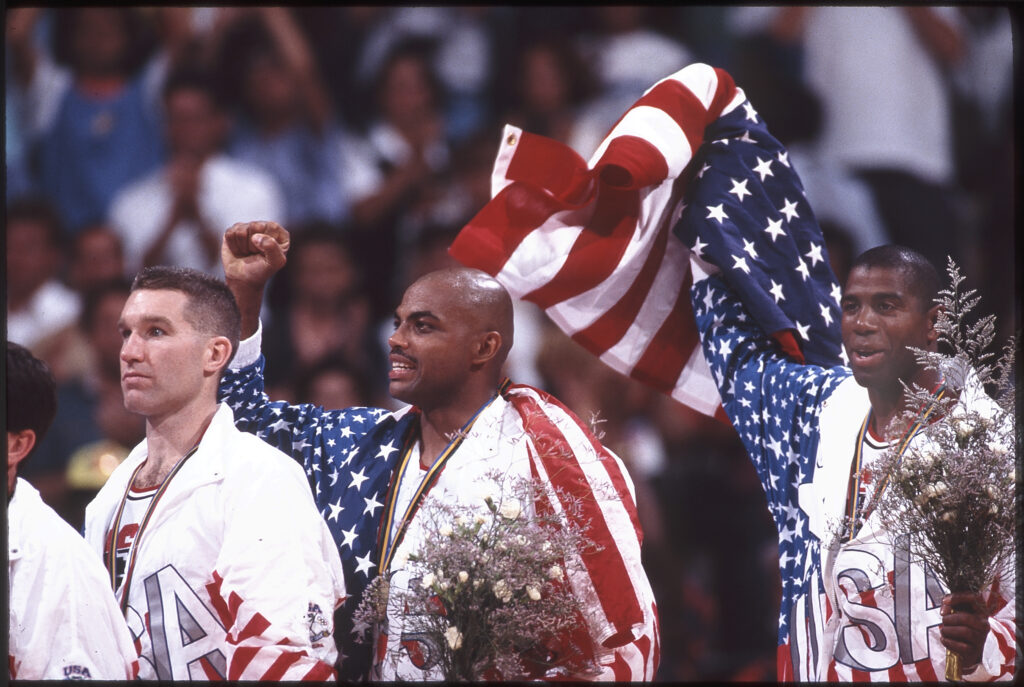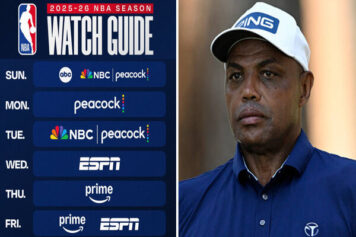Charles Barkley, the NBA legend and popular NBA on TNT commentator, kept it real on a variety of topics, including how long he decides to continue blessing microphones as he nears retirement from television, on a new episode of “The Pivot Podcast.”
The show’s co-hosts and former NFL stars Ryan Clark, Channing Crowder and Fred Taylor chopped it up with another A-list celebrity in Barkley and got him to reveal just how much longer fans will be able to see him on the beloved NBA on TNT studio show.
Some might be surprised by his answer.
“I got two years left on my contract and I think that’s going to be it for me,” said Barkley. “I’ll be 61 when my contract ends and I just had my first grandson. Holding that little dude was one of the coolest experiences of my life. I’m gonna die sooner than later, and not that I haven’t enjoyed my life, but I just want to play golf, fish and travel the world. Do I want to work or travel and have fun? That’s the way I’m leaning. But I have two years until I have to make this decision.”
Barkley’s Best Coach Ever
With the great success that Barkley has achieved throughout his career, both on and off of the court, he still cites his grandmother as the biggest influence on his overall achievement.
While he tells a tale of fellow legend Moses Malone being the one who got him into the shape necessary to launch his NBA greatness, it was the discipline instilled by his grandmother that made him who he is.
“My grandma is the greatest person in my life, but she drove me nuts,” said Barkley. “She thought she was a player-coach. She called me after every game saying stuff like ‘you’re embarrassing me boy getting only seven rebounds.’ She was a hard-working woman and she demanded hard work out of everyone. The reason I’ve had a work ethic is because of her.”
Being Second-Best to MJ On The Greatest Team Ever
In discussing his storied playing career, the hosts ask Barkley about his time with the “Dream Team” at the 1992 Olympics. Specifically, how he reacted to coach Chuck Daly telling him that he was the second-best player on the team, behind Michael Jordan.
“I said, ‘I agree with you, but I’m going to put an end to that sh-t next year’,” said Barkley, referring to his run with the Phoenix Suns. “I said, ‘we’re playing them in the Finals and I’m going to bring it.’ When I got to Phoenix, I told them on the first day that we’re going to the finals and that I’m sick of everyone telling me that he’s better than me. … We got there and they beat us. That was the first time I ever said in my life that there was someone who was better than me at basketball. In my whole life. I had Manute Bol and Shelton Jones, so I thought that those guys weren’t better than me, they just had more help.”
Winning Time: Magic & Bird Saved The NBA In The ’80s
Barkley continues to explain how despite his role in the NBA at the time, he was fine with the extra shine that fellow Dream Teamers Magic Johnson and Larry Bird received, because of their important place in the history and development of the league as a whole.
“The reason I wasn’t upset, was because Magic and Larry were the two most important figures in NBA history,” said Barkley. “They saved the NBA. When I got to the NBA, the average salary was $250,000. Those two guys came and had the greatest rivalry in history. But what I really admired, is that they’re just basketball junkies. Things just started to take off with them, then Michael took it to another level. I thank those guys for making sure I didn’t have to get another job. The only thing I feel bad about are the guys like Bill Russell and Julius Erving, because they built a foundation for them.”

Charles Barkley was one of many stars on the 1992 Olympic Dream Team. (Photo by Icon Sportswire)
The episode also goes deep into Barkley’s career as an analyst for the NBA on TNT, which Clark claims he may be even more famous for than his playing career. When Taylor asks if Barkley considers himself controversial or opinionated, Barkley describes how race is a factor in him being perceived the way he is.
“It has something to do with race, because I hear that all the time, but I don’t think I’m saying things that others aren’t,” explained Barkley. “They throw around those code words when they’re talking about brothers on television. The white guys say the exact same things as me, and they’re considered experts. It always makes me laugh, because I don’t think I’m controversial. I’m always going to be a straight-shooter. … If I say something, even if people disagree, nobody is going to be able to say that I’m just doing it to get clicks.
I’ve always got a plan. If there’s something I want to have a conversation about, I’ll throw gasoline on the fire first to get people to talk about it. Our job is to get people to think for themselves, especially when it’s a serious issue. I don’t think I’m right all the time, but I want people to think and talk.”
Passionate About Social Issues
This leads into more discussion about Barkley’s past comments about racial justice and policing, as Barkley expounds on the concerns he views when going into predominantly Black schools and how he always preaches that kids need to look past just athletics and entertainment for future careers. For Barkley, a conversation he had with the controversial right-wing commentator Rush Limbaugh cemented his view on politics and individual autonomy.
“Limbaugh said to me that he didn’t believe half the sh-t he would say on radio and TV,” said Barkley. “He told me that he’s just playing a character. It really made me see that we’re all part of a game that we don’t know we’re in. … My point is that if you’re waiting on these political parties to make your life better, then you’re wrong. You have to take control of your life and put yourself in a position to be successful.”
Impact Of Having No Rings: NBA Legacy
Closing out the episode, the hosts ask Barkley about the frequent criticism he’s received for never winning an NBA championship during his career. From Barkley’s perspective that critique doesn’t bother him, because of basketball being a team game and because of just how far he came from his humble roots in Alabama.
“When did it become an individual thing?” asked Barkley. “I didn’t realize I was playing golf and tennis. If I went to a really really good team I could have won my championship. I got my shot, and that’s all I can ask for. I gave it all I had. I did the best that I could, and I sleep good at night about what I accomplished. I wasn’t even recruited outside of Alabama in high school. Nobody thought I’d be good, that’s what makes me laugh about it.”



